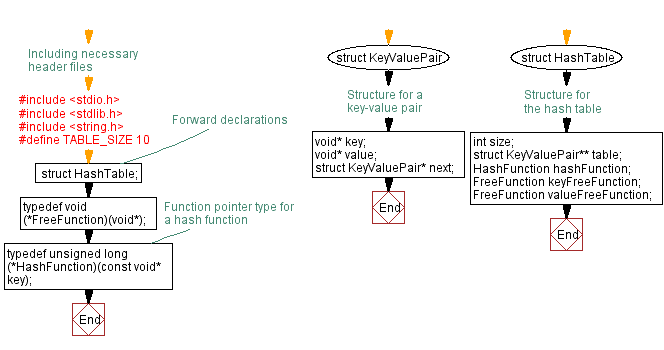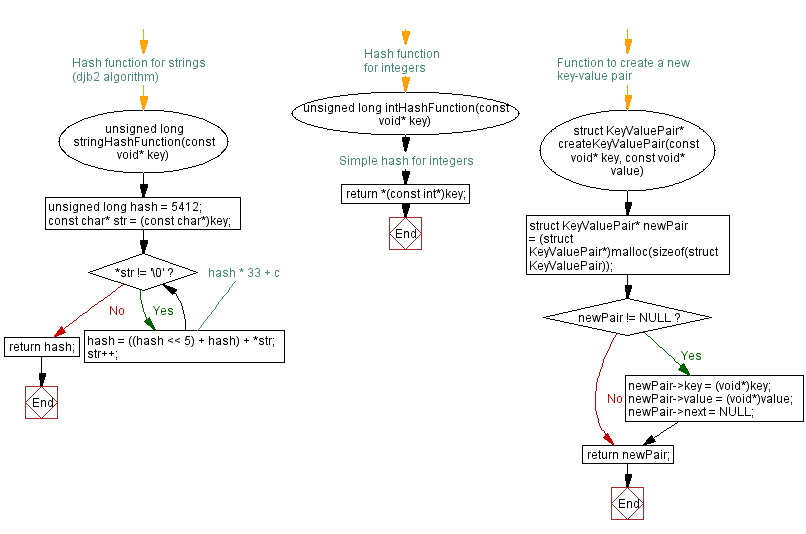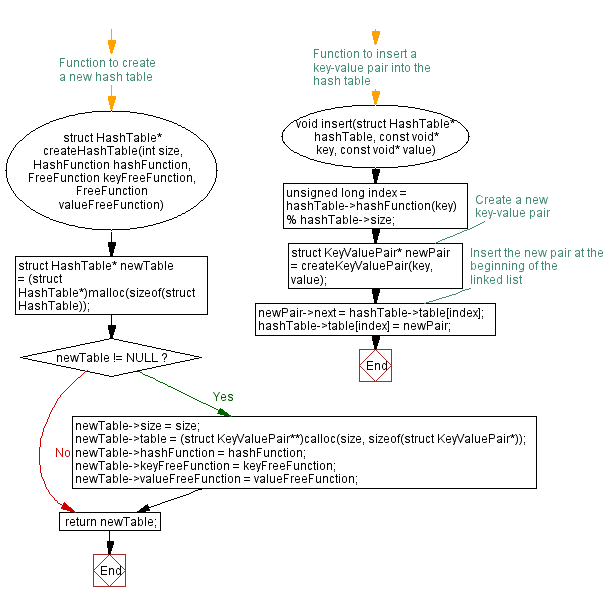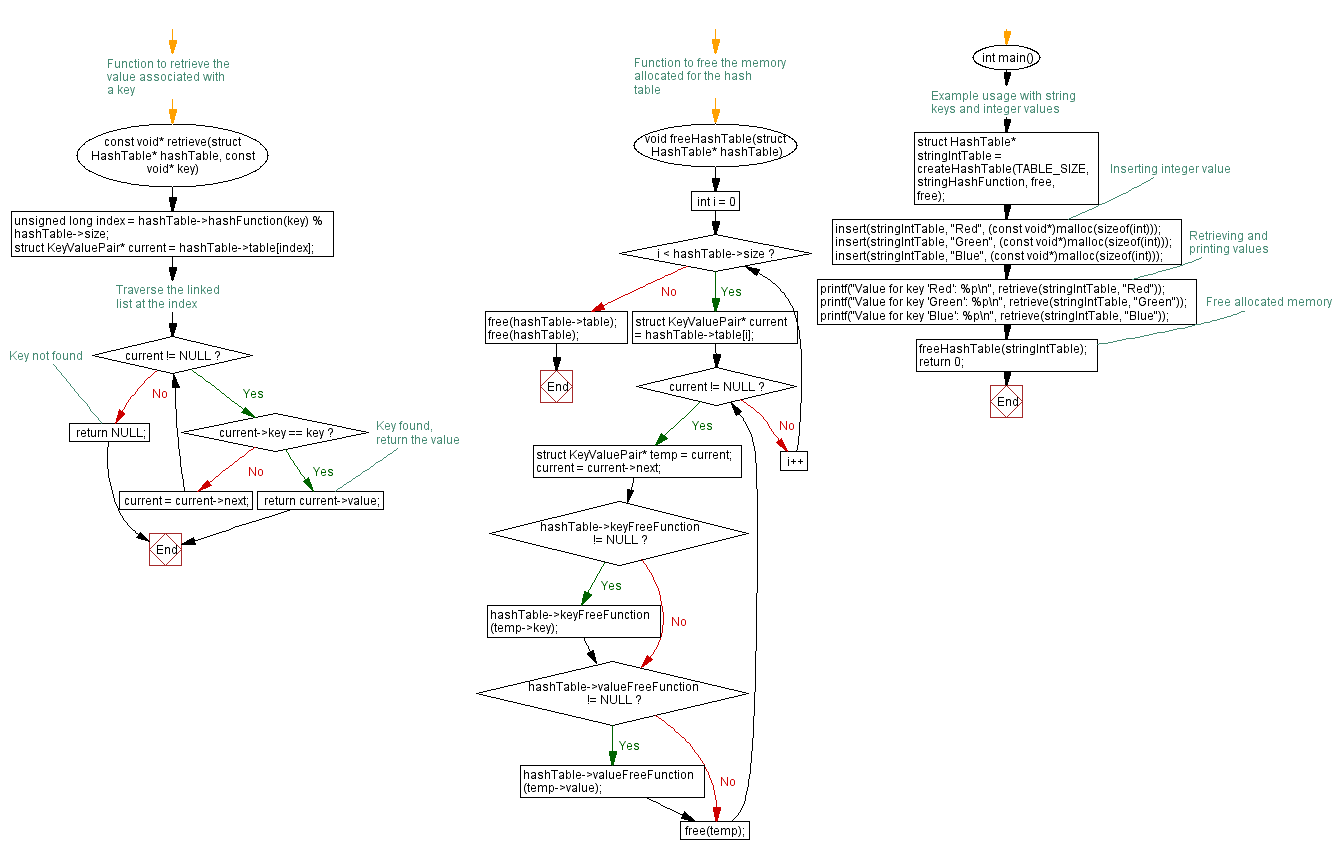Creating a Generic Hash table in C for flexible data storage
9. Generic Hash Table Challenges
Write a C program that modifies a hash table to handle a generic data type, allowing it to store and retrieve data of any type.
Sample Solution:
C Code:
// Including necessary header files
#include <stdio.h>
#include <stdlib.h>
#include <string.h>
#define TABLE_SIZE 10
// Forward declarations
struct HashTable;
typedef void (*FreeFunction)(void*);
// Function pointer type for a hash function
typedef unsigned long (*HashFunction)(const void* key);
// Structure for a key-value pair
struct KeyValuePair {
void* key;
void* value;
struct KeyValuePair* next;
};
// Structure for the hash table
struct HashTable {
int size;
struct KeyValuePair** table;
HashFunction hashFunction;
FreeFunction keyFreeFunction;
FreeFunction valueFreeFunction;
};
// Hash function for strings (djb2 algorithm)
unsigned long stringHashFunction(const void* key) {
unsigned long hash = 5412;
const char* str = (const char*)key;
while (*str != '\0') {
hash = ((hash << 5) + hash) + *str; // hash * 33 + c
str++;
}
return hash;
}
// Hash function for integers
unsigned long intHashFunction(const void* key) {
return *(const int*)key; // Simple hash for integers
}
// Function to create a new key-value pair
struct KeyValuePair* createKeyValuePair(const void* key, const void* value) {
struct KeyValuePair* newPair = (struct KeyValuePair*)malloc(sizeof(struct KeyValuePair));
if (newPair != NULL) {
newPair->key = (void*)key;
newPair->value = (void*)value;
newPair->next = NULL;
}
return newPair;
}
// Function to create a new hash table
struct HashTable* createHashTable(int size, HashFunction hashFunction, FreeFunction keyFreeFunction, FreeFunction valueFreeFunction) {
struct HashTable* newTable = (struct HashTable*)malloc(sizeof(struct HashTable));
if (newTable != NULL) {
newTable->size = size;
newTable->table = (struct KeyValuePair**)calloc(size, sizeof(struct KeyValuePair*));
newTable->hashFunction = hashFunction;
newTable->keyFreeFunction = keyFreeFunction;
newTable->valueFreeFunction = valueFreeFunction;
}
return newTable;
}
// Function to insert a key-value pair into the hash table
void insert(struct HashTable* hashTable, const void* key, const void* value) {
unsigned long index = hashTable->hashFunction(key) % hashTable->size;
// Create a new key-value pair
struct KeyValuePair* newPair = createKeyValuePair(key, value);
// Insert the new pair at the beginning of the linked list
newPair->next = hashTable->table[index];
hashTable->table[index] = newPair;
}
// Function to retrieve the value associated with a key
const void* retrieve(struct HashTable* hashTable, const void* key) {
unsigned long index = hashTable->hashFunction(key) % hashTable->size;
struct KeyValuePair* current = hashTable->table[index];
// Traverse the linked list at the index
while (current != NULL) {
if (current->key == key) {
return current->value; // Key found, return the value
}
current = current->next;
}
return NULL; // Key not found
}
// Function to free the memory allocated for the hash table
void freeHashTable(struct HashTable* hashTable) {
for (int i = 0; i < hashTable->size; i++) {
struct KeyValuePair* current = hashTable->table[i];
while (current != NULL) {
struct KeyValuePair* temp = current;
current = current->next;
if (hashTable->keyFreeFunction != NULL) {
hashTable->keyFreeFunction(temp->key);
}
if (hashTable->valueFreeFunction != NULL) {
hashTable->valueFreeFunction(temp->value);
}
free(temp);
}
}
free(hashTable->table);
free(hashTable);
}
int main() {
// Example usage with string keys and integer values
struct HashTable* stringIntTable = createHashTable(TABLE_SIZE, stringHashFunction, free, free);
insert(stringIntTable, "Red", (const void*)malloc(sizeof(int))); // Inserting integer value
insert(stringIntTable, "Green", (const void*)malloc(sizeof(int)));
insert(stringIntTable, "Blue", (const void*)malloc(sizeof(int)));
// Retrieving and printing values
printf("Value for key 'Red': %p\n", retrieve(stringIntTable, "Red"));
printf("Value for key 'Green': %p\n", retrieve(stringIntTable, "Green"));
printf("Value for key 'Blue': %p\n", retrieve(stringIntTable, "Blue"));
// Free allocated memory
freeHashTable(stringIntTable);
return 0;
}
Output:
Value for key 'Red': 00000000000C1470 Value for key 'Green': 00000000000C14B0 Value for key 'Blue': 00000000000C14F0
Explanation:
In the exercise above,
- Hash Function and Key-Value Pair Structures:
- Two hash functions ("stringHashFunction()" and "intHashFunction()") are defined for string and integer keys.
- The 'KeyValuePair' structure represents a key-value pair with void* pointers for generic data.
- Hash Table Structure:
- The 'HashTable' structure contains information about the hash table, including size, an array of key-value pair pointers, and function pointers for hash, key-free, and value-free functions.
- Functions:
- createKeyValuePair: Creates a new key-value pair.
- createHashTable: Creates a new hash table with specified size and function pointers.
- insert: Inserts a key-value pair into the hash table.
- retrieve: Retrieves the value associated with a key from the hash table.
- freeHashTable: Frees the memory allocated for the hash table.
- Main Function:
- Creates a hash table (stringIntTable) for string keys and integer values.
- Inserts key-value pairs into the hash table.
- Retrieves and prints values associated with specific keys.
- Frees the allocated memory for the hash table.
- Example Usage:
- The main function demonstrates the generic hash table with string keys and integer values.
- Memory allocation is done for integer values, and the free function is used to release memory when freeing the hash table.
Flowchart




For more Practice: Solve these Related Problems:
- Write a C program to implement a generic hash table using void pointers and function pointers for custom key comparison.
- Write a C program to design a generic hash table that stores multiple data types and prints type information during retrieval.
- Write a C program to implement a generic hash table that performs deep copying of complex user-defined data structures.
- Write a C program to implement a generic hash table that integrates with custom memory allocation functions provided by the user.
Go to:
PREV : Collision Resolution Performance Comparison Challenges.
NEXT : Hash Table Spell Checker Challenges.
C Programming Code Editor:
Have another way to solve this solution? Contribute your code (and comments) through Disqus.
What is the difficulty level of this exercise?
Test your Programming skills with w3resource's quiz.
